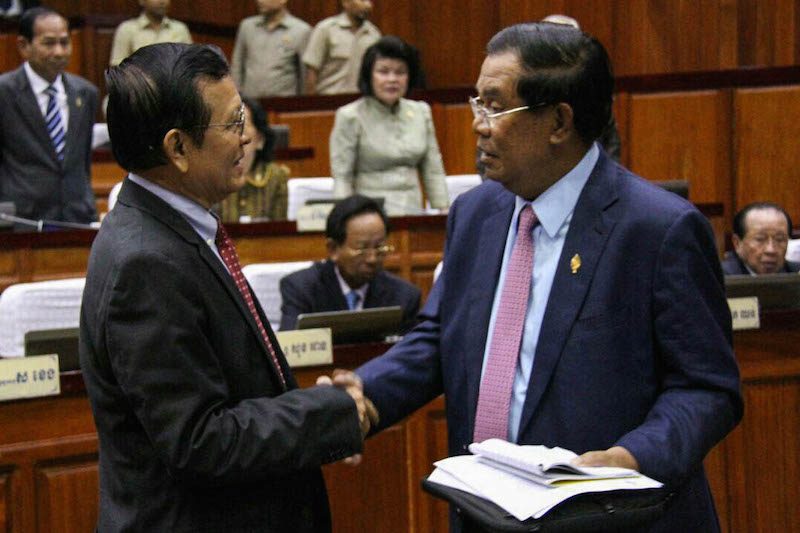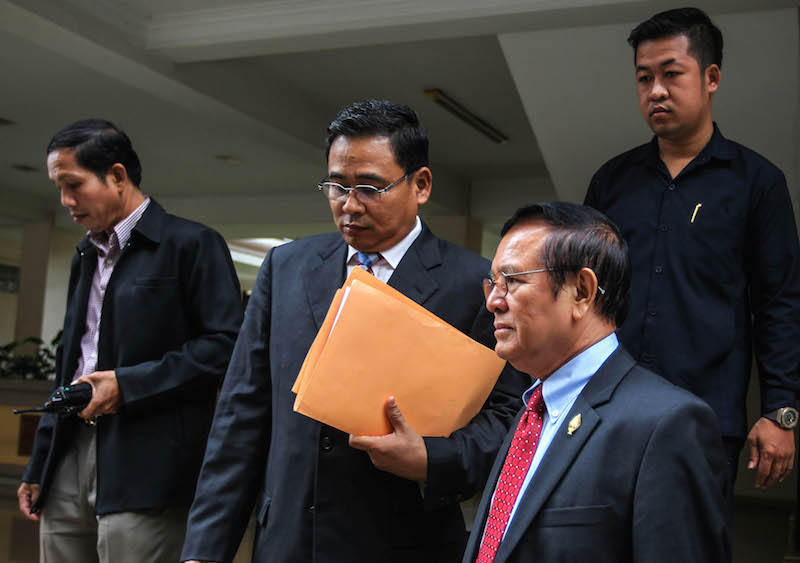In a move that further marginalized opposition leader Sam Rainsy and threatened to deepen party fissures, Prime Minister Hun Sen said that acting CNRP president Kem Sokha would replace Mr. Rainsy as his point of contact in the opposition.
The announcement, which occurred just days after King Norodom Sihamoni’s pardon of Mr. Sokha in a “prostitution” case at the behest of Mr. Hun Sen, contradicted tweets from the exiled Mr. Rainsy on Monday saying that he would remain minority leader.

Mr. Hun Sen said on Wednesday that the change in pecking order stemmed from a CNRP request on Monday for Mr. Sokha to replace Mr. Rainsy as head of the “minority group” in parliament, the term that was settled on due to the CPP’s distaste for “opposition.”
“The chief of the minority group is the dialogue partner with the head of government in regard to national issues,” Mr. Hun Sen said, citing article 48 of the assembly rules. “Chief of minority group is the position equivalent to prime minister.”
A smiling Mr. Sokha said he hoped for mutually beneficial dialogue with the man who recently threatened to imprison him “forever” for charges widely seen as politically motivated, also downplaying the significance of his new role as minority leader.
In a meeting with the prime minister earlier in the day, Mr. Sokha said the pair had “found some agreements such as…national unity in order to create stability, peace, and development for our country and people.”
“Today we are here to move forward toward the target we haven’t yet reached,” he told parliament. “What we have to do next is find national unity for improving our nation,” he said, adding that he welcomed “constructive criticism with the goal of increasing our development,” but not insults or taunts that could “break society.”
Mr. Rainsy, declining to answer questions about his previous assertion that he would remain minority leader, said he was not bothered by the move.
“Labels and titles are not important. What is important is one’s integrity and dignity,” he said in an email. “I gladly accept everything if I can help rescue our country and make it prosperous.”
Saying that he had been kicked out of parliament, sentenced to prison and most recently blocked from returning to the country, Mr. Rainsy said the CPP was interpreting rules however the party pleased.
“But I remain true to myself and will remain faithful to my motherland until the end of my life,” he said.
CNRP lawmaker Mu Sochua said Mr. Rainsy had taken part in a vote of the party’s permanent committee via Skype, in which he supported the decision for Mr. Sokha to lead opposition lawmakers and represent them in talks with Interior Minister Sar Kheng.
“There is no split within the party,” she said. “Mr. Rainsy remains the person to dialogue with Mr. Hun Sen.”
However, Prince Sisowath Thomico, a prominent member of the CNRP’s steering committee, acknowledged that the party may not have a choice in the matter.
“As long as the prime minister stated that Kem Sokha is his partner, I think we don’t have anything to say,” the prince said.

Given Mr. Hun Sen’s penchant for dividing opposition leaders, the projection of unity between the two CNRP leaders did not ensure that relations would remain harmonious.
“We are under attack from the CPP once again,” Prince Thomico said, adding that the attack could further factional differences if unaddressed. “I still fear that we might be divided.”
CNRP spokesman Yim Sovann said party leaders “do not focus on the position on paper.”
When asked why Mr. Rainsy had made a point of emphasizing his position days earlier, though, Mr. Sovann demurred.
“You can see politics is very complicated,” he said.
Those complications could threaten to break the two men whose fragile alliance holds the CNRP together, according to Sophal Ear, author of “Aid Dependence in Cambodia: How Foreign Assistance Undermines Democracy.”
“We’re about to see if the CNRP (as we know it) survives, aren’t we?” he wrote in an email. “I don’t think Sam Rainsy has much of a choice. Is he going to come back to Cambodia and fight to retain his position as Supremo? Switching places with Kem Sokha is better than being ousted completely.”
Mr. Sokha “has a strong will to power” and might therefore be more amenable than Mr. Rainsy to enter a unity government with Mr. Hun Sen down the road, according to Markus Karbaum, a German political scientist focused on Cambodia.
“Most likely, this becomes the big factional dispute within the opposition for the next one and a half years. While its outcome is hardly to predict today, it is obvious which direction Hun Sen prefers to prevail,” he said in an email.
Ou Virak, a political analyst who heads a think tank in Phnom Penh, predicted that the prime minister would be “sitting and enjoying” any fallout from factional fighting.
To survive this and future tests of unity, the CNRP “need to make the party more like a party and less like a two man show,” he said.
“I doubt Sam Rainsy will be able to restrain his ego, and he’ll make poor decisions because of it.”



